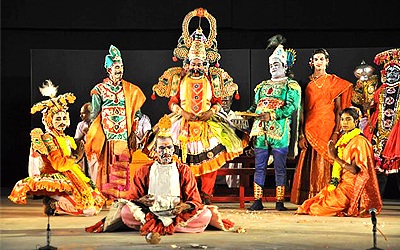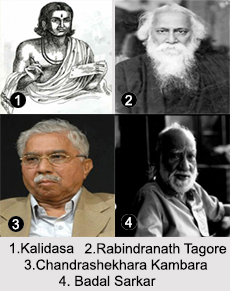 Terukkuttu is a form of street theatre especially in Tamil language. Terukkuttu is a form of entertainment, ritual and social instruction. This form of street theatre mainly focuses on epics like Mahabharata. Terukkuttu when plays Mahabharata concentrates on the character of Draupadi.
Terukkuttu is a form of street theatre especially in Tamil language. Terukkuttu is a form of entertainment, ritual and social instruction. This form of street theatre mainly focuses on epics like Mahabharata. Terukkuttu when plays Mahabharata concentrates on the character of Draupadi.
The word Terukkuttu is derived from "Teru" which means street and "kkuttu" means theatre. Thus the word Terukkuttu means street theatre. Therrukkuttu is not more than two or three centuries old. The Terukkuttu is thus bracketed within the Piracankam, and the Piracankam is bracketed within the full cycle of temple ceremonies.
Terukkuttu plays concentrates on the epic of Mahabharata. Even in the plays depicting the stories of Mahabharata they concentrate on the character of Draupadi. The Terukkuttu plays also perform on the stories of Ramayana.
The street theatres of Tamil Nadu include song, music, dance and drama. The actors generally put on colourful drapery. The various musical instruments which are used by the actors are drums, harmonium and cymbals.
Generally a Terukkuttu play ends usually with the completion of the war. The Terukkuttu dramas themselves can thus provide a "nine nights`" worship. Rather than nine being counted as half of eighteen, it would be more correct to say that eighteen is the equivalent of ten (or nine) as the appropriate length of a festival celebrating the goddess through the Mahabharata. In this respect, it is also highly significant that within the Draupadi cult, it is the Terukkuttu that frequently provides the counterpart to this most pre-eminent of royal rituals.
Theme of Terukkutu
The terukuttu performances centre around the enactment of stories from Mahabharata thereby emphasizing on the role of Draupadi. Plays on Ramayana are performed at Mariyamman festivals.
These plays are generally a part of ritual celebrations that also include the twenty-one day temple festival starting in Chittirai, the first month in the Tamil calendar. The terukkuttu performances continue till the morning of the second last day.
The major themes include: marriage of Draupadi, marriage of Subhadra, Marriage of Arjuna with Alli, promise of Draupadi, Arjuna`s penance, mission of Krishna, Abhimanyu`s defeat, Karna`s defeat, Battle of the Eighteenth Day and the sacrifice of Aravan in the Battlefield.
Style of Terukkutu
Terukkuttu plays comprises of song, music, dance and drama. Colourful costumes are worn by the actors. The musical instruments are harmonium, drums, a mukhavinai and cymbals.
At the courtyard of the temple an acting ground is marked out where people crouch on the three sides of the rectangular arena. The chorus of singers and the musicians stand on the rear side of the stage and the actors use the front side. Two persons hold a curtain and enter the arena, with an actor who has been dressed as Lord Ganesh, the elephant-headed Hindu god. The chorus begins an invocation to Ganesha and prayers are offered to several other deities. Thereafter the narrator appears on the stage. Kattiyakkaran relates the story and introduces the characters. At times the characters introduce themselves. Kattiyakkaran links the scenes, provides context to the happenings on the stage and joke between the scenes. Each song is rendered in a raga that is preceded by viruttam. Thereafter an actor delivers a speech based on that song.




